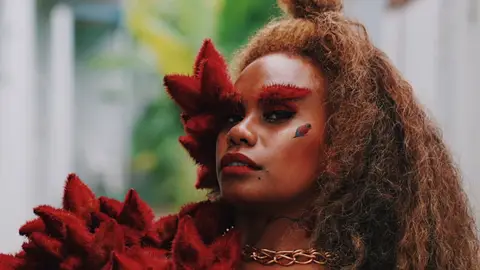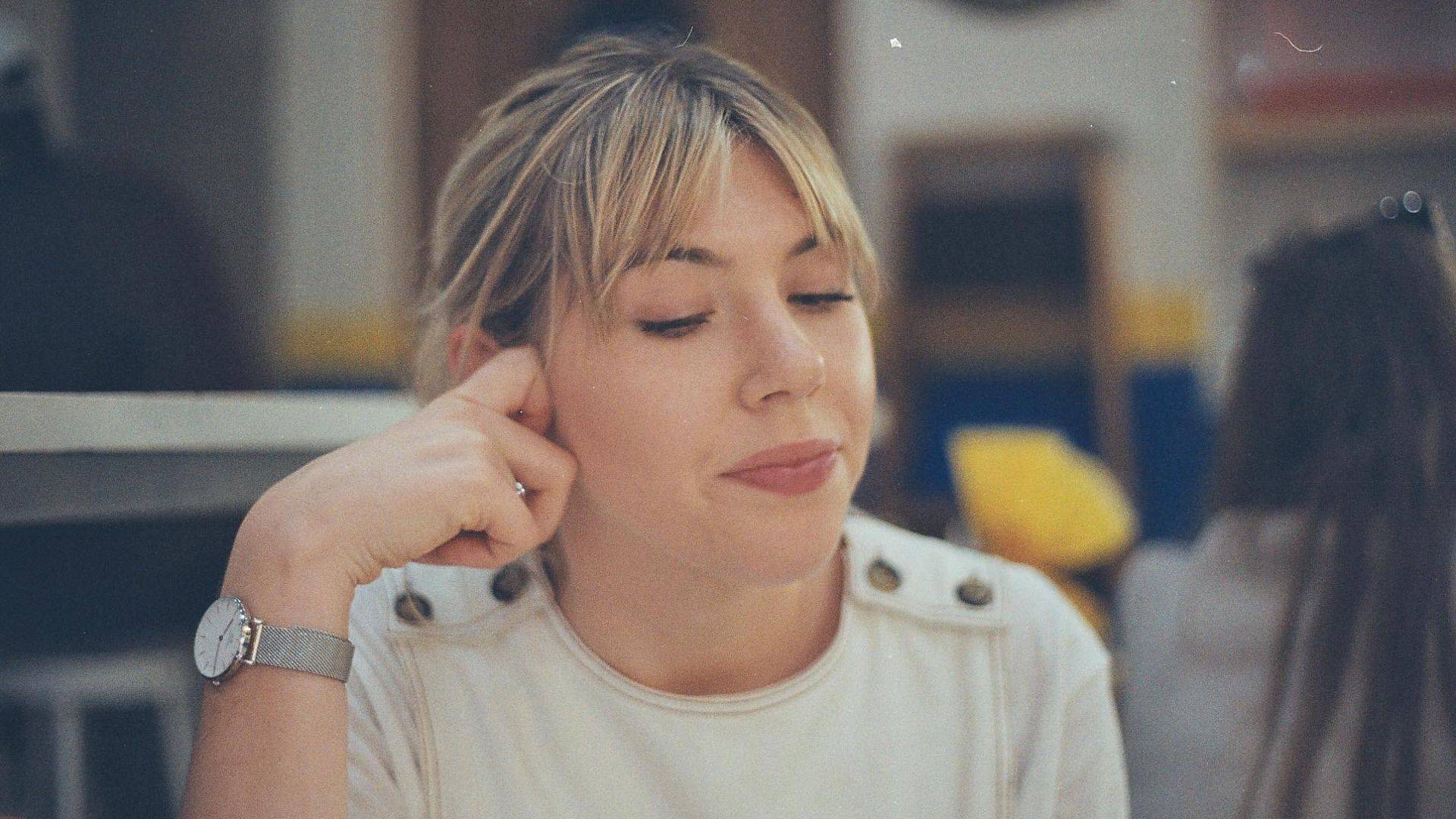Home Is Wherever Ngaiire Is

When Ngaiire feels, she feels it all. There’s a power in her words that only comes from a winding journey of euphoria and trauma, and a commitment to learning how to cope with both, and everything in-between. She feels connected to herself, her past and her future in ways most of us will never even begin to fathom.
Like the rest of us, Ngaiire’s life was completely shaken by the pandemic. Her plans to return to her home country of Papua New Guinea were obviously shelved, she gave birth to her son despite near-fatal pregnancy complications and weathered a music industry blighted by ongoing COVID-19 restrictions.
Yet, here she stands. She refuses to falter. In the past three or so years, she has worked tirelessly to reconnect the chapters of her life so she can decipher their lessons, and she shares them in her new album 3 – which, for all intents and purposes, is a reset.
“I think that this is the album that really changed me as a person on so many different levels, but especially creatively,” Ngaiire tells MTV Australia.
“I gave myself more permission to be the creative that I've always wanted to be and not feel like I needed to exist within [a certain set of] boundaries.”
As a woman of colour who immigrated from Papua New Guinea in her teens, Ngaiire quickly learned about the many societal and creative boundaries she would have to try and work with, work around or attempt to destroy entirely. But that in itself is a process that takes time.
Ngaiire’s musical journey in the public eye began in the most quintessentially Australian way possible – on Australian Idol. Competing in the show’s second season and making it to the semi-finals, Ngaiire then worked as a session vocalist before hunkering down on her own craft at the turn of the decade. That culminated in her 2013 debut album, Lamentations, before she followed it up with 2016’s Blastoma – named after the cancer she battled as a child. The following year, her work on 3 had begun.
“Because of the colorful life I've had and the major life experiences I had even before I turned 16, I'd just focused on being strong and being like, ‘I'll just keep going. I've got to keep going’,” she said.
“And I think a lot of people do that and forget that sometimes you've got to allow yourself to process things. Especially with the pandemic, a lot of people are feeling it right now. It's giving us the chance to go, ‘Oh, shit – this thing that I thought I'd put in the back of my head and burnt in the fire and that kind of stuff still needs to be dealt with’."
That’s when 3 was born. Ngaiire closed her eyes and sunk into her history. It’s a stunningly diverse record, with each song approaching an incredibly particular topic that differs from every other track. “Shoestring”, jittery and electrifying, is an ode to the matriarchs in Ngaiire’s life and a thank you to the sacrifices they made. “Takeover”, comforting and hopeful, is about Ngaiire’s undying love of Papua New Guinea. “Moonshine” is a yearning for escape from the pain of pregnancy complications, and “Him” is a love letter to the child that was born despite the odds.
While a deeply personal album, 3 also endeavours to unpack wider societal issues, especially within Papua New Guinea. Her single “Closer” delves into the subduing of sexuality Ngaiire experienced in PNG, and “Boom” sees that suppression naturally come to its explosive climax. The brooding and pseudo-anarchic closer “Glitter” is a direct reminder to remember our power as people when the people in power want us to forget it.
Ngaiire melts the personal and political beautifully, making her narrative a part of a wider societal one, and vice versa. But, her existence on Indigenous land – she’s speaking to us on Darkinjung country otherwise known as NSW’s Central Coast – as a Warabung, Morobe, Tolai, Niu Ailan post-colonial Papua New Guinean is inherently political. Being a woman, being of colour and being an immigrant doesn’t exactly guarantee you a cushy life in Australia.
But 3 never sounds preachy or propagandic. It’s that melting of her own experiences into larger-scale problems that make her messages more easily understood, but also help contextualise them for those who are yet to catch on. 3 wasn’t meant for everyone – at times, Ngaiire sounds like it was made for just her – but her songwriting never alienates.
“In terms of [writing about] personal stuff, I think you really have to be ready to talk about it, and if you're not, then it's just like banging your head against a brick wall, trying to communicate something that you're not ready to talk about,” she mused. “And so it comes across as dishonest”.
“And then on the other side, if you're trying to communicate something that's happening to a community, it still comes from your personal view anyway,” she continues. “So you run the risk of someone in the community going, ‘Well, hang on. That's not how I see it. I live within the community as well. And I have these intersectional experiences that you don't have’.”
The pain and pleasure that Ngaiire embeds into the very fabric of songs on 3 helps prevent her from sounding like she’s speaking for anyone else. It’s clear Ngaiire has utmost respect for community, and a first-hand understanding of its importance.
“It’s a double-edged sword when my parents wanted to give my siblings and me a better life and better opportunities by coming to Australia for a better education,” she explains. “But I think one of the unfortunate things that happens is that you sever and damage those ties back to culture and back to family and your community and your village.”
“I had to essentially build my own family, which is my band, the queer community, anyone who's had a similar experience to mine, because it runs in my blood,” she says.
“It runs in everyone's DNA to want to have that connection and that community. No one's an island. We want to be able to connect to people. I think people are realising that we can't continue living every man for himself. Everyone needs to pop each other up and help each other and be a village.”
Ngaiire also found solidarity with other women of colour in the music industry in a new way recently, which she found surprising – “I've just been head down, bum up just trying to get everything ready for the release of the album”.
She explains, following the worldwide Black Lives Matter protests last June, that Sampa The Great had the idea for “all of us women from diverse backgrounds to come together and just see what we could do as a community”.
The list of attendees was impressive: Tkay Maidza, Jesswar, Ecca Vandal, Emma Donovan and some 30 others.
“We were just there for each other, listening to our stories and just going, ‘Oh my gosh. It feels so good to have this’. This community that we've all been yearning for, but we all have just been so busy surviving within our spaces that we haven't really thought about. We never reached out and said ‘Hey, I'm really struggling with this,’ or ‘I'm really struggling with what this promoter said to me and it made me feel really unsafe and hurt and traumatised’.”
“That was the first time that I felt supported in my community, just having all of us Black and Brown women coming together to talk about the trauma that they've faced through their careers, but also how much more concentrated it felt through the pandemic and the protests.”
Sampa’s initiative helped reset Ngaiire’s faith in those around her in the industry – she was reminded that she never has to do anything alone. It makes sense that it comes during an incredibly volatile period; both of her life and the world at large. With everything moving at breakneck speed, Ngaiire was yearning for a brief pause to take it all in. Enter the album’s title track, the opener and Ngaiire’s own favourite.
“3” – the song – is deeply meditative. The choral vocals are invigorating and soothing, almost applying a level of ambience to it. She repeats “I count to 3”, manifesting change. That’s what we’ve all done, since we were toddlers, after all. Not only is it her favourite, but it’s one that has changed meaning given our recent turbulence.
"Man, this is how everyone's feeling right now,” she says, “We're in a space where we all just want to let go and just lean into this uncertainty and not be butting heads with it so much.”
“For me personally, I'm just being angry at just losing all my gigs and just every second call I get from my manager is like, ‘So, this gig that we were going to do in September, we're going to have to cancel it’.”
Despite that, Ngaiire says, “There's no other way to maintain your mental health and maintain some kind of sanity without letting go. And I think that ‘3’ has definitely brought on a new meaning in this time than it did for me three or four years ago.”
3 is divine in all senses, even its title seeming a little too perfect to be coincidental.
“We lost three people that contributed to the album,” she says. “I'm one of three children. My mother has three brothers. It took about three years to make the album. I created three artworks to accompany the singles and the album. There also seemed to be three very clear stages of making this album in particular.”
“Oh, and my child is three now, too.”
Ngaiire’s child turning three feels significant. Not because of the number, and not because it’s a birthday. It’s the fact that Ngaiire is alive and well to see the milestone, after she once feared the birth would kill her. Maybe that’s why, with everything she says, there’s hope. 3 is as about trauma as it is about love, but Ngaiire made it through OK enough to tell the tale.
It’s an album that’s rich and textural; contains eons of history in its very framework but at the same time remains cutting and fresh. Her setbacks are never permanent – she’s even announced a tour for later this year despite all odds – and she keeps pushing forward.
“Letting go is an ongoing process,” she says. “Even after going through what I've gone through putting this album together, I've still got so much to process. It's just a series of blocks, or even experiences in life, that you need to go through to just keep getting better, keep improving as a person and keep finding your place and being comfortable with who you are.”
“That’s just life.”
Words and interview by Jackson Langford, senior music and culture writer at MTV Australia. Hot takes at @jacksonlangford and hotter pics at @jacksonlangford.





